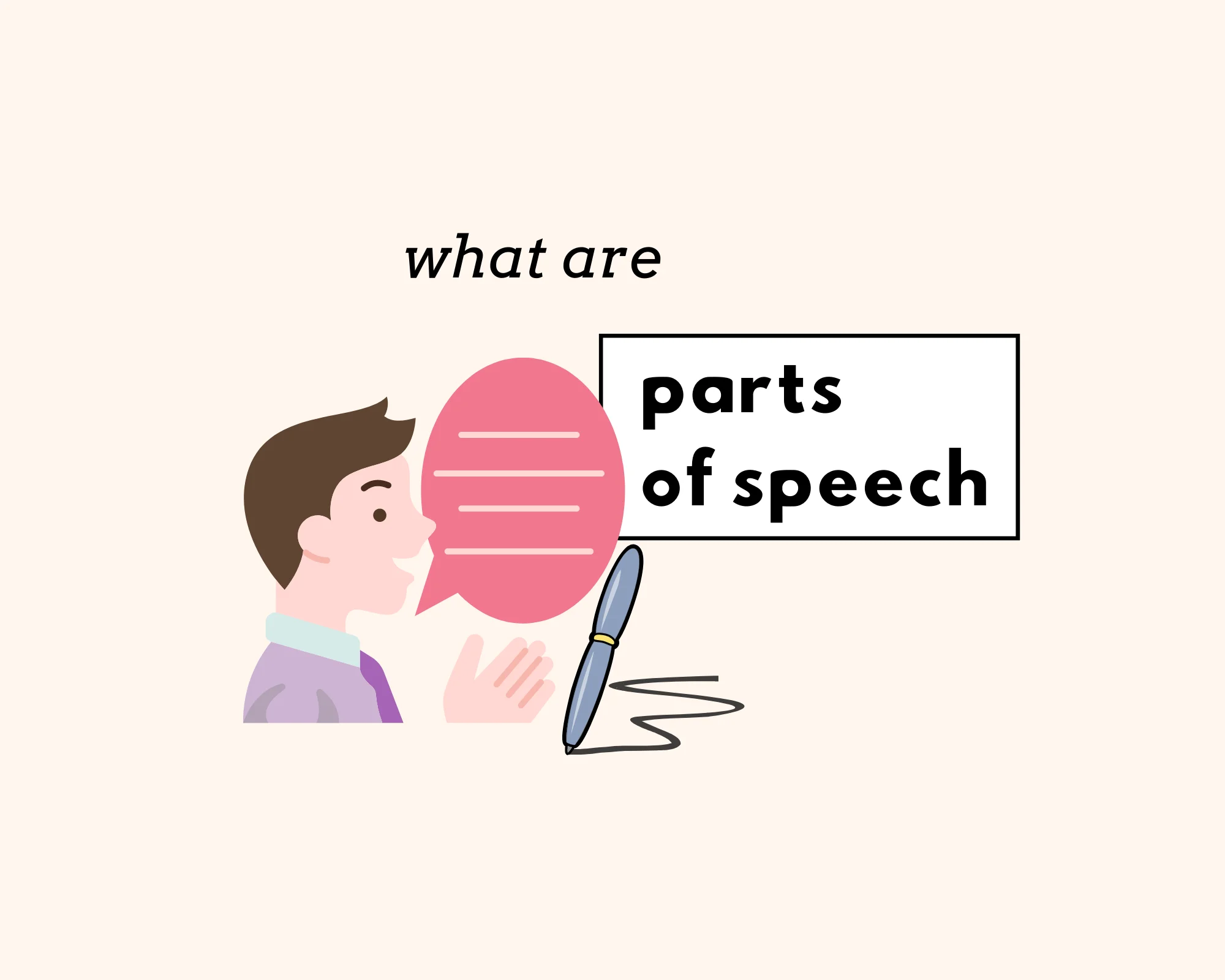Contents
Toggle
What are parts of speech?
When we speak, we use words. When we write or communicate through text, we also use words. Every word in English falls under one of the essential parts of speech.
The term ‘part of speech’ just means whichever word class any word belongs to. There are eight main parts of speech, and each one is responsible for a different though principal role in language.
- Nouns
- Adjectives
- Pronouns
- Verbs
- Adverbs
- Prepositions
- Interjections
- Conjunction
Nouns
Nouns are name places, people, things or ideas:
| Sentences with nouns | |
| Henry VII was considered an accomplished king. This is my dog, Bruno. Adam brought mangoes from the market. |
The different kind of nouns include:
Adjectives
Adjectives tell us about nouns: they are describing words, and modify nouns in some way, shape or form, by giving us more information. Adjectives add meaning to nouns: they derive from the Latin word, adjectivum “that is added to (the noun).” A way to remember adjectives is by the mnemonic: adjectives add. They add meaning to sentences by telling us more about the subjects/objects (and other parts of sentences,)
| Sentences with adjectives | |
| Beth is a clever girl. The steak looks delicious. Jane is smarter than her brother. |
Adjectives come in different types, depending on the kind of information they provide:
- Descriptive adjectives: Beth is a clever girl.
- Proper adjectives: Beth is Spanish.
- Quantitative adjectives: ‘You didn’t eat any of your dinner!’
- Numeral adjectives: I am the fourth child, and youngest of all my siblings.
- Demonstrative adjectives: Those are my shoes.
- Interrogative adjectives: Whose shoes do those belong to?
- Comparisons vs. superlatives
Descriptive, or adjectives of quality give us information about the kinds of traits, characteristics or qualities the thing referenced has.
Proper adjectives are the adjectival form of proper nouns, and describe a proper noun. Numerals answer how much of something is mentioned. Quantitative tells the number or quantity of something, either definitely or indefinitely.
Demonstratives answers what is being referenced.There are only three interrogative adjectives: What, which, and whose. They are paired with nouns to form questions.
Tells us to what degree or extent something has of a quality or trait; or compares the degree to which the subject/noun has this trait over someone/something else.
Pronouns
Pronouns are words that stand in the place of names. The Latin root of pronoun, pronomen, directly translates to “stand in the place of nouns.” Pronouns comes in the first person, second, and third case.
Each describes a point of view: first person is from the speaker’s perspective, and uses first person pronouns, such as I, me, my, and mine. First person plural includes we, our, ours, and us.
| Sentences with pronouns | |
| Sam isn’t at school today because he is sick. You do not need to shout. I will have to be at work late tonight. |
The second person perspective addresses you: the person being spoken to. Second person singular and plural are the same: you, your, and yours. The third person is the POV of those that are being spoken about: his, her, him, her, them, they.
If English didn’t include pronouns, speech and writing would sound and read as follows:
Henry went to the grocery store, because Henry was out of food. Henry decided to walk to the grocery store. Once Henry was finished with Henry’s shopping, Henry waited in the checkout to pay.
Pronouns replace the proper name of a noun; and in doing so, they make English easier and less repetitive as a whole. Many pronouns assume gender; that said, gender neutral or ambiguous pronouns include they/them.
Verbs
Verbs are action words, and can express a state of being.
Verbs are a broad category of language, and they are not limited to describing actions, or even individual words. There are 11 main types of verbs:
- Action verbs
- Stative verbs
- Transitive verbs
- Intransitive verbs
- Linking verbs
- Helping verbs (or auxiliary verbs)
- Modal verbs
- Regular verbs
- Irregular verbs
- Phrasal verbs
- Infinitives
Adverbs
Adverbs modify verbs, adjectives or other adverbs. Altogether there are 7 types of adverbs:
- Adverbs of time
- Adverbs of frequency
- Adverbs of place
- Adverbs of manner
- Adverbs of degree or quantity
- Adverbs of affirmation and negation
- Adverbs of reason
- He counted the money hurriedly.
- She pronounced the word quite correclty.
Prepositions
Prepositions are paired with nouns or pronouns to indicate position, or where things stand in relation to each other.
- There are ducks in our swimming pool! (Tony Soprano, The Sopranos)
- We sat on the bench and spoke for a while.
Conjunctions
Conjunctions are smaller words that connect words, phrases or clauses together in sentences.
There are three main classes of conjunctions: coordinating, subordinating and correlative. The coordinating conjunctions, (which you can remember by the mnemonic FANBOYS), connect words and clauses of the same grammatical type.
These conjunctions take parts of sentences, such as a clause (dependent or independent,) and conjoin them to make complex sentences, and so on.
| Sentences with conjunctions | |
| You’re not allowed to go because you’re too young. Two and two make four. We looked everywhere, but there are no Ubers in the forests. |
Interjections
Interjections interject: they are exclamations of a feeling, or sudden emotion:
- Hurray!
- Finally! They left!
- Yikes!
Learn the main parts of speech
- What Are Pronouns? (First, Second, and Third)
- Types of Verbs (Modal, Stative, Infinitives and Transitives)
- Types of Adjectives (Explained, with Examples)
- What’s an Adverb? (Types of Adverbs)
- When to Use ‘A’ or ‘An’ (What’s an Article?)
- Types of Nouns (Common, Proper, Abstract, and Concrete)
Sources
- P.C. Wren, High School English Grammar and Composition.
- The Elements of Style, Strunk & White.










